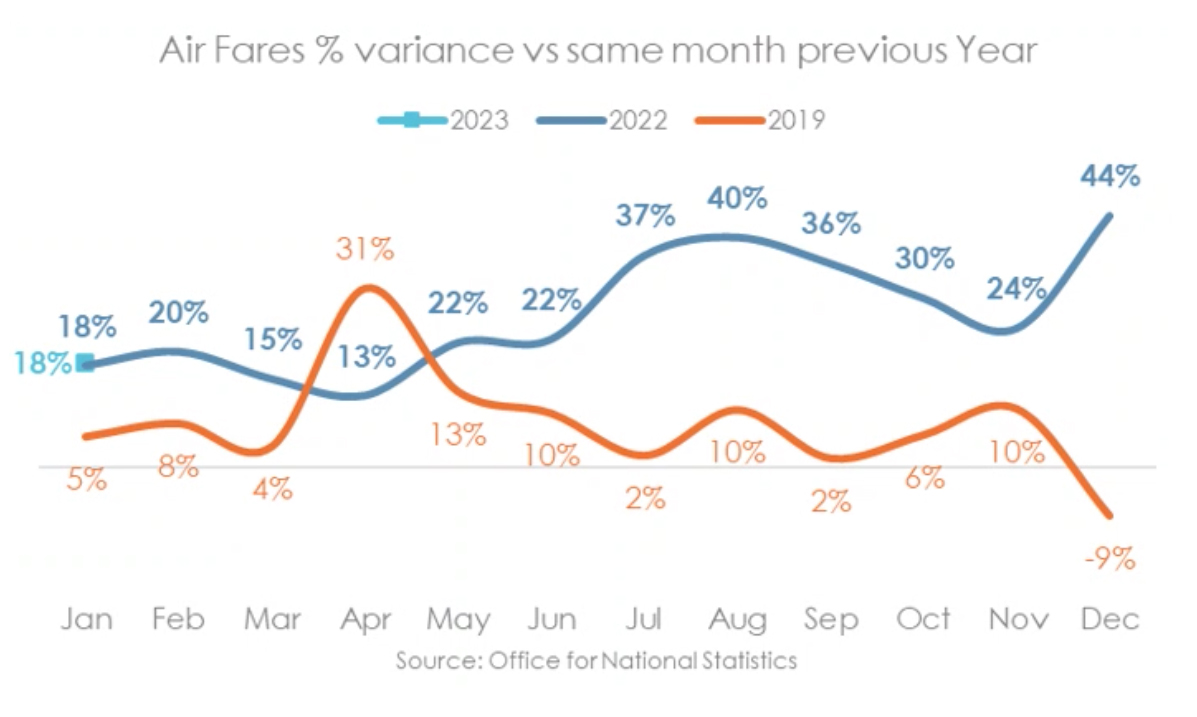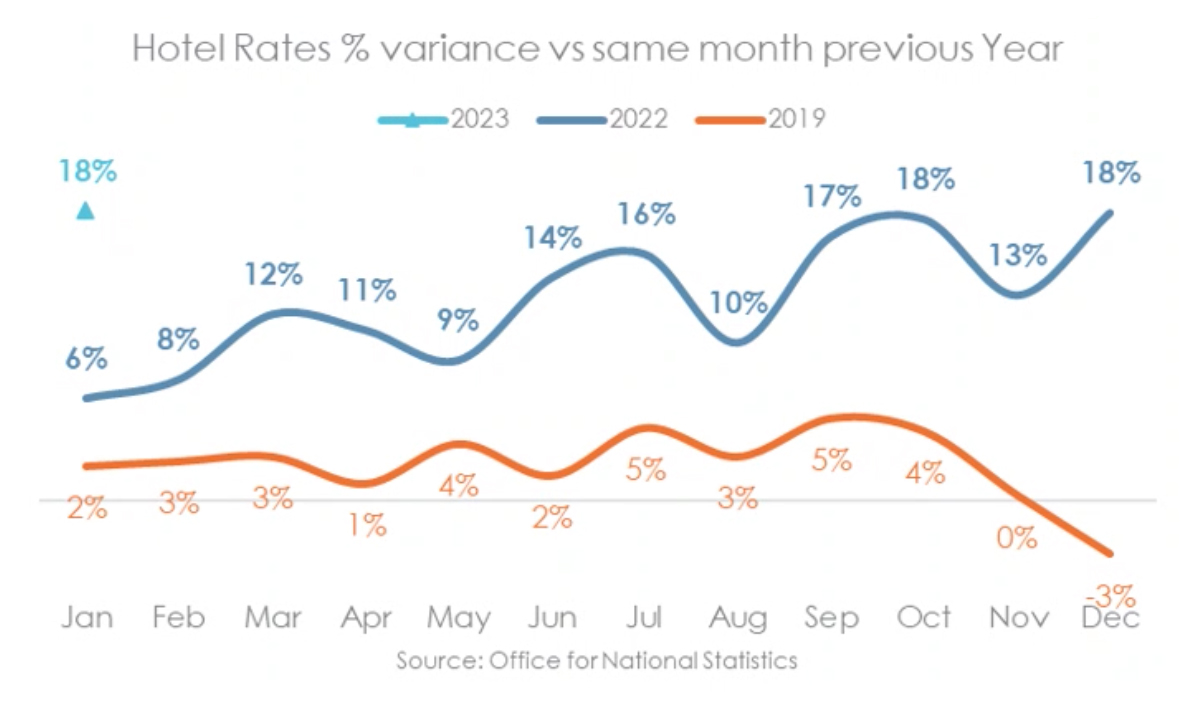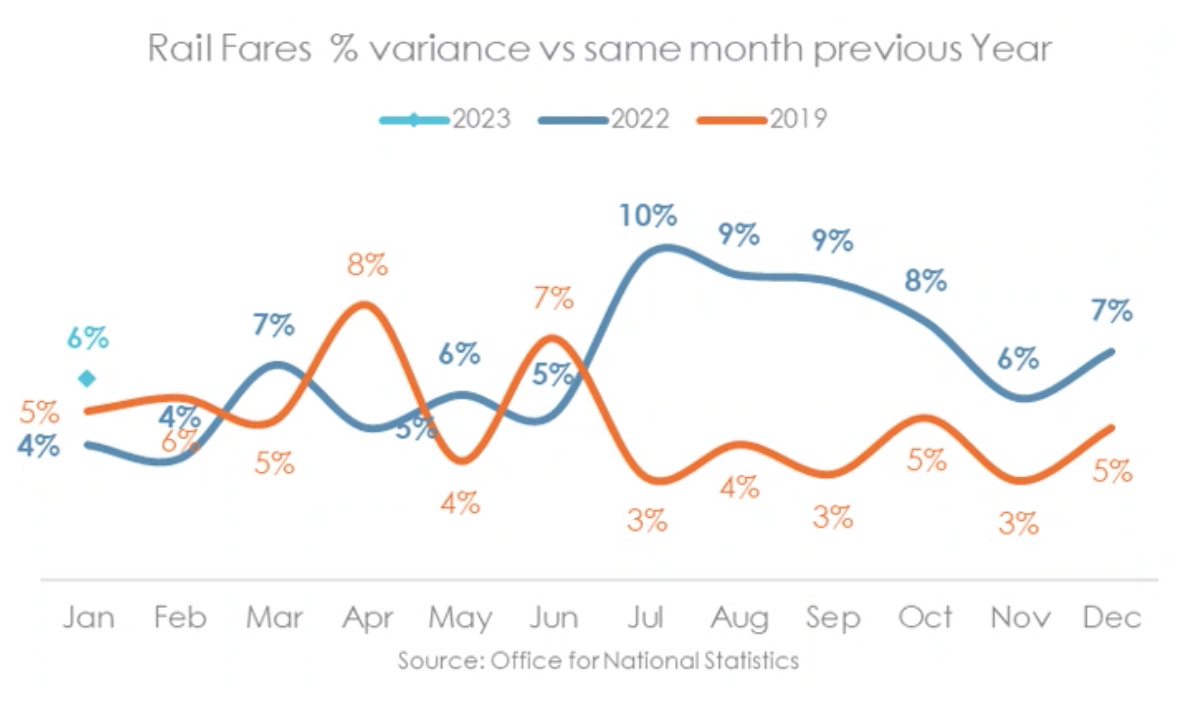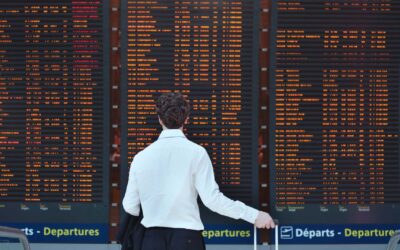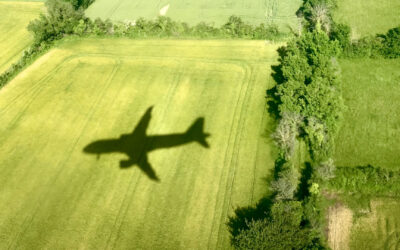
Inflation is at record levels and the cost-of-living crisis is becoming an ever more real threat to many organisations.
We turn our analytical spotlight closer to home to explore the potential of a cost-of travel crisis facing many UK businesses today, and we present a range of practical, inflation-busting measures you can put in place to mitigate this.
Let’s begin with a little understanding; what actually is inflation? In short, inflation is a persistent rise in prices over time, affecting the cost of goods and services, and ultimately reducing the purchasing power of money. The travel industry is no exception to this, and businesses that travel for work purposes can be significantly impacted by inflation, particularly when it comes to airline fares and hotel rates. In this blog, we will examine the impacts of inflation on business travel and its supply chain and explore how this affects prices for airline fares and hotel rates.
One of the primary impacts of inflation on the business travel supply chain is the increase in the cost of goods and services that are required to operate the industry. This includes fuel costs, staff costs, and the costs of raw materials used in the production of goods and services. As these costs increase, airlines and hotels must raise their prices in order to maintain profitability, which can result in a direct increase in the cost of airline fares and hotel rates, as well as rail.
In addition to direct impacts, inflation can also have indirect impacts on the business travel supply chain. For example, inflation can lead to higher interest rates, which can increase the cost of borrowing and reduce consumer spending. This can reduce demand for travel, leading to lower revenue for airlines, rail operators and hotels. Inflation can also lead to currency devaluation, making imports more expensive and putting additional pressure on the travel industry to raise prices to compensate for their increased costs.
Another factor to consider is the increase in the cost of labour. As we’re seeing every day in the news, as the cost-of-living increases, employees may demand higher wages, which can increase the cost of providing services; this is particularly prevalent within the current rail disputes over pay and conditions. This can also result in a reduction in the profit margins of these companies, as they struggle to maintain their profitability in the face of rising costs. For the traveller, this not only means increased prices but also potential disruption due to strikes and other industrial action which can adversely affect the running and reliability of services.
How Prices Will Be Affected in 2023
AIR
- Domestic rates increase by 5%
- European rates increase by 6%
- Long-Haul rates increase between 2-10% (Africa and the Middle East will be lowest and Asia highest, driven by China)
These figures are following the 23-25% price increases we saw in 2022.
HOTEL
- London rates increase by 10%
- Regional rates increase by +10%
The charts (below) show the variance for air, hotel and rail fares over the last three years.
Click on a chart to expand it…

RAIL
- Domestic regulated fares will increase by 5.9% from March 1st.
- Regulated fares cover about 45% of fares, including season tickets.
- Un-regulated fares (the other 55%) may, most likely, go up by a lot more.
In terms of airline fares, inflation can have a major impact on the prices that consumers pay for travel. Airlines must pass on the increased costs of goods and services to their customers, and this often results in higher ticket prices. This can make air travel more expensive for businesses, reducing the number of trips that are taken and the amount of revenue generated by the airline industry. Similarly, inflation can also have an impact on rail and hotel rates. Hotels must also pass on their increased costs to consumers, and this can result in higher room rates.
At Gray Dawes Travel, we understand the importance of managing the cost of business travel, particularly in the face of rising prices due to inflation. Our team of experienced travel consultants is committed to finding the most cost-effective travel options for our clients, and we work closely with airlines and hotels to secure the best rates. In addition, we’re able to consult on alternatives to travel as part of your wider corporate travel policy. For example, options such as video conferencing and alternative modes of transportation, to help businesses minimise their travel costs and reduce the impact of inflation on their bottom line.
How To Bust Inflation for Business Travel
The key drivers to combating the effect of inflation on business travel and to control costs are:
- increasing online adoption
- purchasing travel in advance as much as possible
- managing ticket flexibility
- ensuring your have strong approval processes to drive compliance with your travel policy
- implementing a hotel programme with negotiated rates
Air
Purchasing air tickets in advance can also create considerable savings. Booking a long-haul trip 21 days in advance, instead of a week prior to travel, can save up to 57 per cent of cost. Within Europe, if a long-haul air ticket is booked 14 days in advance instead of seven days, companies can save approximately 37 per cent. If you’re able to do so, we advise booking a non-refundable ticket rather than a fully-flexible fare as this can save up to 73 per cent on long-haul flights. And ensure you have full access to NDC (New Distribution Capability) content within your booking tool or via your TMC.
Hotel
To make the most of a hotel programme, we recommend focusing on a concise number of hotels, driving spend to two or three properties per location, in order to negotiate better rates. Again, booking in advance will secure better rates.

Rail
When it comes to rail, booking two advance single fares rather than a return fare can also reduce costs. It’s about being as organised as possible to reap the benefits of this approach.
Communicating the benefits behind new purchasing processes can also help to overcome traveller push-back. Try implementing one or two changes instead of tackling the entire travel policy. With the correct management inclination and good analytics, you can start to target different groups or cost centres within your organisation.
Of course, our strong affiliation with the BTA – Business Travel Association – is a vital route to government for us and the wider business travel industry. Chaired by our very own CEO, Suzanne Horner, the BTA is the representative association for the business travel community and travel management companies, with their TMC members accounting for over ninety percent of all managed travel booked in the UK. The BTA’s industry partners are all influential travel industry suppliers including airlines, airports, accommodation companies, rail, car rental, technology, payment and ancillary product providers. Working with members and industry partners, the BTA raise the profile of the vital role business travel plays in the broader economy. This includes facilitating leading industry events, commissioning surveys and research and lobbying organisations that can impact and influence our industry; including suppliers, UK Government and EU legislators.
The impacts of inflation on the business travel supply chain can be significant, affecting the prices of airline fares and hotel rates. The rise in the cost of goods and services, along with indirect impacts such as higher interest rates and currency devaluation, can make travel more expensive for businesses, reducing the number of trips that are taken and the amount of revenue generated by the travel industry. However, by working with a trusted travel management partner like Gray Dawes Travel, businesses can minimise the impact of inflation on their travel expenses and maintain their ability to travel for work purposes.
Our team of experts is dedicated to finding the most cost-effective travel options, and we are always here to help you navigate the challenges of business travel. Get in touch today to discuss how we can help you bust business travel inflation.
Download the White Paper
Enter a few details below to download your copy of our FREE ‘How To Control Costs In A Corporate Travel Programme’ white paper.
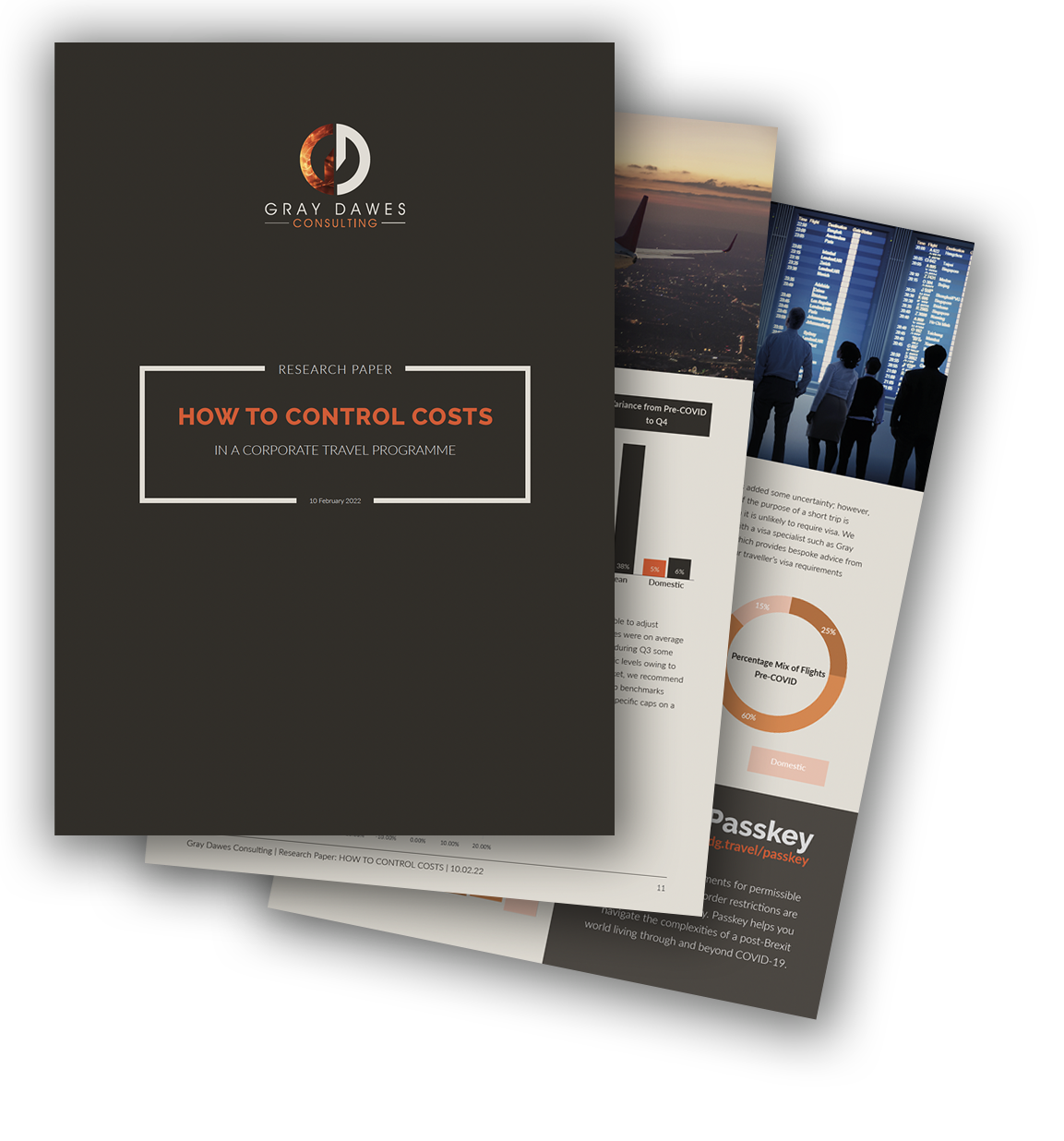
Related Articles
What is the True Value of a TMC?
A recent article from The Business Travel Magazine claims that Travel Management Companies (TMCs) like Gray Dawes are struggling to provide value for their clients. However, at Gray Dawes, we respectfully and heartily disagree… After all, not all TMCs are created equally. Tarring everyone with the same brush only serves to devalue the brilliant work and innovative thinking that organisations such as ours bring to the industry. In this article, we take a deeper look at the “Value Proposition” piece from the Business Travel Magazine and demonstrate how we are genuinely doing things differently.
How the Paris Olympics 2024 will Impact Business Travel (And What You Can Do About It)
The Olympic Games are heading to Paris in July. Over 10,000 athletes will be throwing, swimming, running, cycling, and more for the chance to grab a gold medal and write themselves into the annals of Olympic history. But with an estimated 15 million visitors planning to head to the event according to the Paris je t’aime tourist office, travelling to and within Europe for work will almost certainly be affected. In this article, we take a look at how the Paris Olympics 2024 might impact business travel and offer our expert tips and advice to help you keep your trip on course.
Flight100: Testing The Limits of Sustainable Aviation Fuel (SAF)
The use and effectiveness of Sustainable Aviation Fuel (SAF) remains one of the hottest topics in business travel. Back in 28 November 2023, Virgin Atlantic successfully operated Flight100 – the world’s first commercial SAF flight from London to New York. In this article we extract the key findings of the ground-breaking feat as outlined in the Executive Summary produced by the team behind it all.
